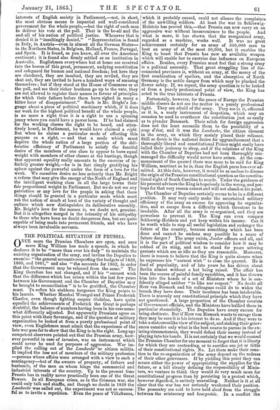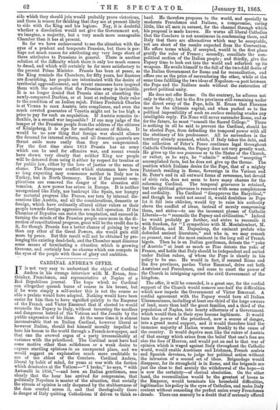THE POLITICAL SITUATION IN PRUSSIA.
ONCE more the Prussian Chambers are open, and once more Bing William has made a speech-, in which he declares it to be "more than ever his duty" to maintain the existing organization of the army, and invites the Deputies to examine "the general accounts respecting the budgets of 1859, 1860, and 1861," and also "the accounts for 1862, in order that the Government may be released from the same." The King therefore has not changed, and if his "earnest wish that the difference which has arisen within the last few years between his Government and the Chamber of Deputies may be brought to reconciliation" is to be gratified,. the Chamber must. To soften his stubborn burgesses the King points to his laurels. Whether Marshal Wrangel and Prince Frederick Charles, even though fighting auspice Gulielmo, have quite equalled the achievements of Frederick the Great is perhaps doubtful, the balance of numbers having been in his case some- what differently adjusted. But apparently Prussians agree on this point with their Sovereign, and if the question of military organization be looked at from a purely professional point of view, even Englishmen must admit that the experience of the fate war goes far to show that the King is in the right. Long ago competent observers pointed out that the Prussian army, how- ever powerful in case of invasion, was an instrument which could never be used for purposes of aggression. War im- plied the calling out of the Landwehr or citizen militia. It implied the loss not of members of the military profession —persons whose affairs were arranged with a view to such a contingency—but of the owners of property, of fathers and husbands, of the men on whom hinge the commercial and industrial interests of the country. Up to the present time Prussia has in reality never practically been one of the Great Powers. In all European crises, as in the Crimean war, she could only talk and shuffle, and though no doubt in 1859 the Landwehr was called out, the experiment was not so success- ful as to invite a repetition. ' Even the peace of Villafranca, which it probably caused, could not silence the complaints of the unwilling soldiers. At least the war in Schleswig- Holstein has proved this,—that Prussia can now carry on an aggressive war without inconvenience to the people. And what is more, it has shown that the reorganized army, regarded as a machine, works well. It was no great achievement certainly for an army of 300,000 men to beat an army of at the most 50,000, but it enables the King to boast that Prussia has now an available weapon which will enable her to exercise due influence on European affairs. Besides, every Prussian must feel that a strong army is a political necessity. That great straggling line of dis- connected provinces is, without an army, at the mercy of the first combination of spoilers, and the absorption of North Germany is the nettle danger from which may be plucked the flower safety. If, we repeat, the army question is to be looked at from a purely professional point of view, the King has acted in the true interests of Prussia.
Fortunately, however, for the peace of Europe the Prussian middle classes do not see the matter in a purely professional light. They are afraid of the army. They see in it, officered as it is, a ready instrument of despotism, which may on occasion be used to overthrow the constitution just as easily as to plunder Denmark. Their relish for foreign aggression does not the least reconcile them to the possibility of a coup or itat, and it was the Landwehr, the citizen element in the army, on which they mainly placed their reliance. Still so fierce is the national desire for aggrandizement that a thoroughly liberal and constitutional Prince might easily have lulled their jealousy to sleep, and if the relations of the King with the Chamber of Deputies had not been thoroughly mis- managed the difficulty would never have arisen. It the com- mencement of the quarrel there was more to be said for King William, martinet as he is, than the English press has ever ad- mitted. It this date, however, it would be as useless to discuss the origin of thePrussian constitutional question as the constitu- tional right of South Carolina to secede. Under the guidance of his present advisers the King is hopelessly in the wrong, and per- haps for that very reason cannot and will not abandon his point.
The Chamber of Deputies certainly seems to be in a different position. It may very easily make the ascertained military efficiency of the army an excuse for approving its organiza- tion, and so escape from a difficulty which threatens to be insoluble. After all the army is re-organized, and they are powerless to prevent it. The King can even conquer Schleswig-Holstein and yet keep within his income. Can it be worth while to stop all useful legislation and endanger the future of the country, because something which has been done and cannot be undone may possibly be a cause of future danger ? The army exists, junker officers and all, and it is the part of political wisdom to consider how it may be robbed of its sting, and not to stand for years uttering protests which are as idle as they are reasonable. Moreover, there is reason to believe that the King is quite sincere when he expresses his "earnest wish" to close the quarrel. He is fond of popularity, and of late years he has driven about Berlin almost without a hat being raised. The affair has been the source of painful family squabbles, and it has thrown him into the hands of a set of Ministers whom he is con- fidently alleged neither "to like nor respect." No doubt all Herr von Bismark and his colleagues could do to widen the breach they have done. Their insolence has been intolerable. There is scarcely any constitutional principle which they have not questioned. A large proportion of the Chamber consists of Government officials, and the Ministers have bullied these in particular shamefully. The Deputies have every excuse for being obstinate. But if Herr von Bismark wants to enrage them they may be sure it is his interest to do so. And if they were to take a statesmanlike view of the subject, and sinking their griev- ances consider only what is the best course to pursue in the ex- isting circumstances, they would defeat their enemy instead of playing into his hands. It is not certainly that we would counsel the Prussian Chamber for one moment to forget that it is liberty for which they are contending, or to sacrifice one jot or tittle of their constitutional rights. No. Let them make their sanc- tion to the re-organization of the army depend on the redress of their other grievances. If by yielding this point they can secure either the power of appropriating the .supplies for the future, or a bill clearly defining the responsibility of Minis- ters, we venture to think they would do very much more for constitutional progress than by persisting in a protest which, however dignified, is entirely unavailing. Neither is it at all clear that the war has not seriously weakened their position. The peasantry are said to have held aloof from the struggle between the aristocracy and bourgeoisie. In a conflict the side which they should join would probably prove victorious, and there is reason for thinking that they are at present likely to side with the King and his legions. Nay, it is doubtful whether a dissolution would not give the Government not, we imagine, a majority, but a very much more manageable Chamber than it has at present. So far we have endeavoured to see the situation with the eyes of a prudent and temperate Prussian, but there is per- haps not much reason for attributing any very large share of these attributes to Prussians in general. There is another solution of the difficulty which there is only too much reason to dread, and which will certainly be far more satisfactory to the present Prime Minister. Prussia has been at peace, as the King reminds the Chambers, for fifty years, her finances are flourishing, her people are intoxicated with the desire of territorial aggrandizement, and recent successes have inspired them with the notion that the Prussian army is invincible. It is no longer denied that Prussia aims at absorbing the newly-conquered Duchies, or at least at reducing their ruler to the condition of an Indian rajah. Prince Frederick Charles is at Vienna to coax Austria into compliance, and even the much coveted guarantee of Venetia might not be too high a price to pay for such an acquisition. If Austria remains in- flexible, is a second war impossible? If one may judge of the temper of the Prussian people from the address of the citizens of Konigsberg, it is ripe for another seizure of Silesia. It would be no new thing that foreign war should silence the demand for internal reform, and all domestic quarrels are thrust aside more easily than they are compromised. For the first time since 1815 Prussia has an army which can be used for offensive war, and recent events have shown very clearly that neither King nor people 'will be deterred from using it either by respect for treaties or for public law, either by the love of justice or the sense of shame. The European conflict which statesmen have been so long expecting may commence neither in Italy nor in Turkey, but in North Germany. Even if the present com- plications are removed the danger of the situation still remains. A new power has arisen in Europe. It is neither nnorganized like Italy, nor bankrupt like Spain, nor hungry for material progress like France, nor torn by internal dis- sensions like Austria, and all the considerations, domestic or foreign, which have ordinarily allured either rulers or their people towards foreign aggression are in full operation. If the Chamber of Deputies can resist the temptation, and succeed in turning the minds of the Prussian people once more in the di- rection of constitutional progress, great will be the credit due to it, for though Prussia has a better chance of gaining by war than any other of the Great Powers, she would gain still more by peace. But this result will not be obtained by pro- longing the existing dead-lock, and the Chamber must discover some means of terminating a situation which is growing tiresome, and certainly has no charms which can compete in the eyes of the people with those of glory and ambition.































 Previous page
Previous page